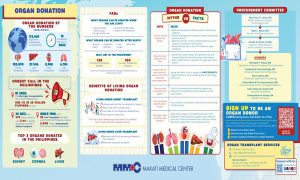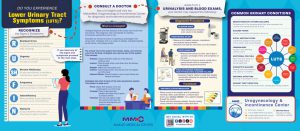While it can be an embarrassing and very personal matter to most individuals, urinary incontinence issues should be quickly addressed to stop conditions from worsening. Helping sufferers every step of the way is premier health institution Makati Medical Center. The hospital’s Urogynecology and Incontinence Center is committed to answering the needs of men and women with urinary problems and pelvic floor disorders via top-of-the-line diagnosis and treatment.
The Center offers a wide variety of diagnostic tests to prepare a patient up for a consultation with the urogynecologist and urologist. Some of these tests include urinalysis, urologic and urogynecologic pelvic examination, bladder scan, cystoscopy,uroflowmetry, urodynamics and pelvic floor rehabilitation.
Interestingly, while this is a problem that can occur in both men and women, women are most likely to develop the condition—some even as early as 15 years of age.
Dr. Stephen Nazareth, co-chair of the Urogynecology and Incontinence Center, shares some of the telltale signs of urogynecological problems: “The common problems or symptoms are urinary incontinence or urine leakage beyond a person’s control. It could also be an overactive bladder, the passing of urine too frequently and urgency in urination. Another common condition is the urinary tract infection or the presence of infection which causes pain while urinating.”
The Center’s other co-chair Dr. Jennifer Marie Jose, a urogynecologist and pelvic reconstructive surgeon, stresses that when these symptoms manifest, it is always best to seek medical advice. “Normally, when Filipinos have incontinence problems, they find it embarrassing—so they don’t seek medical help. But now we are trying to promote awareness on how these problems can be solved with the right medical advice, treatment, and pelvic floor muscle strengthening.”
Since its inception, the Urogynecology and Incontinence Center (one of the hospital’s Centers of Excellence) has served and treated patients with varying types and levels of bladder and incontinence problems. “Here at MakatiMed, we treat patients for all sorts of urinary problems, even those as common as Urinary Tract Infection (UTI). We are equipped with specialized machines, making us one of the more technologically advanced hospitals in the field,” Dr. Nazareth explains.
Beyond the services offered by the hospital, however, both doctors emphasize the importance of knowing how to prevent or manage urinary incontinence on a day-to-day basis. Dr. Nazareth advises to “Train yourself to incorporate simple habits into your current lifestyle that may greatly ease or prevent the development of urinary conditions. For instance, to prevent UTI, train yourself to empty your bladder on a regular basis.” Dr. Jose adds that one should “Make it a point to keep yourself hydrated—have at least 2 liters of fluids. Avoid tea, soft drinks, alcohol and coffee—these are all bladder irritants.”
Dr. Jose concludes: “Early diagnosis all boils down to careful self-monitoring. Leading the right kind of lifestyle guards you against the distressing and uncomfortable manifestations of urinary incontinence. Don’t wait until the symptoms worsen—see your urogynecologist or urologist at the soonest possible time.”
For more information, visit the Makati Medical Center’s Urogynecology and Incontinence Center at the 6th Floor, Tower 2, No. 2 Amorsolo St., Makati City on weekdays from 9 am to 6 pm, and on Saturdays, 9 am to 1 pm. You may also call the MakatiMed 24/7 On-Call Hotline at 8888-999 local 3644, or visit www.makatimed.net.ph










